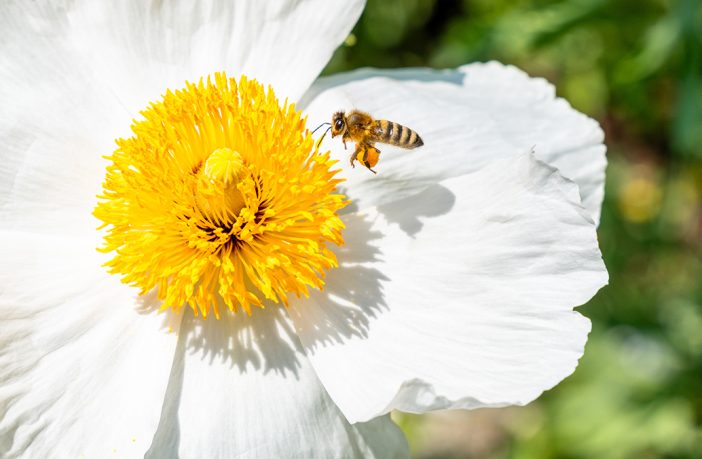New York Attorney General Letitia James and The New York Community Trust (The Trust) today announced that they will be awarding $3.73 million in grant funding to 35 community environmental organizations statewide to support pollinator conservation efforts in New York. The grants are part of the New York Pollinator Conservation Fund, a multi-million-dollar initiative launched by the Office of the Attorney General (OAG) using proceeds from a 2023 settlement with Bayer CropScience and Monsanto for misleading the public about the safety of certain Roundup® consumer weedkillers, which can be toxic to pollinator species like bees and butterflies. An additional $573,000 was provided to the fund by The Trust, a community foundation that supports charitable work across New York. Pollinators are crucial because they help fertilize plants, supporting the production of fruits, vegetables, and other crops that are essential to our food supply and ecosystems. This is the first round of awards from the New York Pollinator Conservation Fund, which aims to support projects that create and protect habitats, promote awareness of the importance of pollinators, and advance community projects on pollinator species in New York.
“Pollinators are the unsung heroes of our environment, yet their very existence has been threatened by the harmful impacts of pesticides, habitat destruction, and climate change,” said Attorney General James. “These grants are a down payment on a more sustainable future for New York. By investing in grassroots initiatives and community-led conservation, we are laying the groundwork for long-term environmental health so that future generations may live in a healthy, green, and vibrant New York.”
“One in every three bites of our food depends on wild and domesticated pollination. Pollinators play an important role in maintaining biodiversity and supporting food production systems,” said Arturo Garcia-Costas, Director of Local, National, and International Environment, The Trust. “The Trust is proud to make this critical investment in reversing pollinator population decline.”
Pollinators are vital for our agriculture and overall ecosystem. By transferring pollen to plants, flowers, fruits, and vegetables, they support the production of more than a third of all our crops. According to a 2022 report of the Empire State Native Pollinator Survey, at least 40 percent — and as many as 60 percent — of pollinator species native to New York are at risk of disappearing from the state, potentially threatening the future growth of crops and wildflowers statewide.
The $3.73 million in grants will fund a wide range of conservation initiatives, including habitat restoration, land management, public education, and community science projects. The grants are being awarded in three categories, with grantees selected by the Trust through a competitive application process. Type One grants provide up to $50,000 for one-year projects to small nonprofit organizations, such as the Greater Irvington Land Conservancy Foundation. Type Two grants provide up to $300,000 over two years for mid-sized nonprofits, such as the Friends of Rogers Environmental Education Center. Type Three grants are matching grants of up to $100,000 for government entities and large nonprofits, such as the Sisters of Saint Joseph of Brentwood. The Trust has also contributed $573,000 to the New York Pollinator Fund.
Grantees include community land trusts, urban environmental coalitions, Indigenous communities, and grassroots education groups. The projects and initiatives funded range from restoring butterfly populations in urban grasslands to transforming parks, campuses, and underused lands into thriving pollinator hubs. Several projects emphasize hands-on learning and public education, and many involve partnerships with local farmers, municipal agencies, and conservation experts to reduce pesticide use, improve land management practices, and produce pollinator-friendly landscapes.
35 organizations throughout New York have been selected as awardees, receiving grants ranging from $9,000 to $500,000 including:
- The Bee Conservancy, a nonprofit organization based in New York City that collects data on bees and other pollinators in historically underserved areas, will receive a $200,000 grant to collect data on pollinator populations in historically disadvantaged areas in New York City and the Hudson Valley.
- The Black Institute, an advocacy group focused on the intersection of environmental justice and racial equity, will receive a $200,000 grant to create models for sustainable land use in public parks across the five boroughs and host educational events to engage community members in sustainability efforts.
- The Shinnecock Indian Nation will receive a $50,000 grant to create community pollinator gardens, plan for reintroducing indigenous plants, and foster youth career development in horticulture.
- Great Swamp Conservancy, a nonprofit focused on promoting environmental education, biological diversity, and conservation of natural resources in the Oneida Lake and Lake Ontario watersheds, will receive a $13,000 grant to host public events on pollinator conservation, organize a pollinator summer camp for young people, and install native bee houses and a bat house.
- Friends of the Chemung River Watershed, a nonprofit that uses education, outreach, and stewardship to protect the Chemung River and its tributaries, will receive a $50,000 grant to plant at least two acres of pollinator gardens in three parks and host educational programs about bees, butterflies, and pollinator gardens.
- Buffalo Niagara Waterkeeper, a nonprofit organization dedicated to protecting and restoring natural resources in the Buffalo Niagara region, will receive a $100,000 grant to expand pollinator habitats along a tributary to the Niagara River and create new habitats for bees and other pollinators in Tonawanda’s Sheridan Park.
A full list of awardees is below.
| Organization | Grant Amount | Region | Project Description | Grant Type |
| Bedford Garden Club | $36,000 | Hudson Valley | Create and improve pollinator habitats in a two-acre native wildflower garden, conduct pollinator surveys and promote educational content, and help three individuals secure pollinator stewardship certification. | 1 |
| Brooklyn Alliance of Neighborhood Gardens Land Trust | $40,000 | New York City | Plant pollinator gardens and create visual education about native plants and pollinators, host workshops and events about pollinator-friendly practices, and collaborate with local schools on pollinator education. | 1 |
| City Island Oyster Reef | $45,000 | New York City | Develop pollinator gardens on a 1.5-acre living shoreline and provide educational opportunities for the community, including students from P.S. 175 in the Bronx. | 1 |
| Creative Corridor Center for Equity | $38,000 | Upstate/Statewide | Develop and run a Pollinator Living Lab program in New York City and Albany to teach young people and their communities to create and manage pollinator habitats. | 1 |
| Friends of Riverside Salem | $500,000 | Upstate | Create three pollinator gardens, host educational events, and launch a new certification program. | 1 |
| Friends of the Chemung River Watershed | $50,000 | Hudson Valley | Plant at least two acres of pollinator gardens in Mark Twain Riverfront Park, McKinnon Park, and Bottcher’s Landing, and host educational programs about bees, butterflies, and pollinator gardens. | 1 |
| Friends of WNYC Transmitter Park | $18,000 | New York City | Create and improve pollinator habitats within the three-acre WNYC Transmitter Park and obtain an NYC Parks Pollinator Place designation. | 1 |
| Garden Club of City Island | $9,000 | New York City | Study pesticide contamination in pollen, nectar, and honey in established apiaries on City Island and educate the local community on pesticide contamination issues. | 1 |
| Great Swamp Conservancy | $13,000 | Upstate/Statewide | Increase community stewardship of pollinators through events, pollinator conservation summer camp, and installation of an observation hive, two native bee houses, and a bat house. | 1 |
| Greater Irvington Land Conservancy Foundation | $16,000 | Hudson Valley | Turn a half-acre wet meadow into a monarch butterfly habitat and educational materials for the community. | 1 |
| Jackson Heights Beautification Group | $10,000 | New York City | Rebuild a 3,600 square foot community garden in Jackson Heights and dedicate 1,800 square feet of it to pollinator habitat. | 1 |
| Long Island Native Plant Initiative | $39,000 | Long Island | Maintain and enhance an acre of native plant gardens by adding seasonal staff, improving irrigation systems, and helping board members obtain pollinator stewardship certifications. | 1 |
| Nassau Land Trust | $20,000 | Long Island | Convert parts of Crossroads Farm into diverse pollinator habitats with educational signage and implement a monitoring program to assess the effect of habitat enhancements on local pollinator populations. | 1 |
| New York City Pollinator Working Group | $13,000 | New York City | Host four pollinator service days at the Maple Street Community Garden and the ENY Success Garden and upgrade the group’s website. | 1 |
| Orange Environment | $16,000 | Hudson Valley | Convert a three-acre field at the entrance of Moonbeams Preserve to a native meadow and create educational signage. | 1 |
| Padoquohan Medicine Lodge of the Shinnecock Indian Nation | $50,000 | Long Island | Build two community pollinator gardens with educational signage, create site plans to remove invasive species and reintroduce indigenous plants, and foster youth career development in horticulture. | 1 |
| Wild Woods Restoration Project | $18,000 | Hudson Valley | Collect and sow seeds to produce around 3,500 spring-blooming native plants, public park forest understory plantings, and educate the public about pollinators. | 1 |
| Black Institute | $200,000 | New York City | Develop tailored land management plans for five pollinator sites. | 2 |
| Catskill Mountainkeeper | $300,000 | Hudson Valley | Improve existing and support future pollinator pathways in the Catskills | 2 |
| Citizens Campaign Fund for the Environment | $200,000 | Long Island | Create three acres of pollinator gardens, plant 70,000 native plants, and develop educational materials. | 2 |
| Freshkills Park Alliance | $150,000 | New York City | Conduct research and improve the Freshkills Park grassland to reintroduce an endangered butterfly and establish a pollinator research and conservation center at the Freshkills Biological Station. | 2 |
| Friends of Rogers Environmental Education Center | $254,000 | Upstate | Establish 25 acres of pollinator habitats and work with community members to develop a dataset on native bee populations in Central New York. | 2 |
| Genesee Valley Conservancy | $105,000 | Upstate/Statewide | Convert a 17.5-acre plot to a permanent pollinator habitat of native wildflowers and create demonstration pollinator gardens in the community. | 2 |
| Jamaica Bay-Rockaway Parks Conservancy | $200,000 | New York City | Create pollinator habitats at locations across Queens and grow pollinator-friendly plants at Floyd Bennett Field to share with the community. | 2 |
| Partners for Climate Action | $247,000 | Hudson Valley | Create five acres of pollinator habitat across 10 sites and produce replicable and customizable template garden designs that people can use to create their own pollinator gardens. | 2 |
| ReWild Long Island | $150,000 | Long Island | Create and maintain 60 community gardens (40 new and 20 existing gardens) collectively covering more than three acres. | 2 |
| The Bee Conservancy | $200,000 | Statewide | Collect data on pollinator populations in historically disadvantaged areas in New York City, Kingston, Albany, Newburgh, and New Paltz. | 2 |
| Westchester Land Trust | $200,000 | Hudson Valley | Maintain and protect pollinator habitats on more than 15 acres of land and host educational events. | 2 |
| Brooklyn Botanic Garden | $86,000 | New York City | Restore and expand pollinator habitats on three acres in its Native Flora Garden. | 3 |
| Buffalo Niagara Waterkeeper | $100,000 | Western New York | Expand pollinator habitats along a tributary to the Niagara River and convert underused lawn space in Sheridan Park into a habitat for native bees and other pollinators. | 3 |
| Dominican Sisters of Hope | $100,000 | Hudson Valley | Protect and expand pollinator habitats within 61 acres of land and turn a 5.5-acre meadow into pollinator habitat. | 3 |
| National Audubon Society | $100,000 | Long Island | Offer workshops in English and Spanish to small-scale landscapers on native plants and develop 1.5 acres of demonstration gardens to serve as learning labs. | 3 |
| National Wildlife Federation | $76,000 | New York City | Engage volunteers and experts to create or certify at least 50 pollinator habitats across the five boroughs, work with local groups to provide technical assistance and grants for pollinator habitats, and organize community educational events. | 3 |
| Sisters of Saint Joseph of Brentwood | $100,000 | Long Island | Create and improve pollinator habitats on its 211-acre campus. | 3 |
| Xerces Society for Invertebrate Conservation | $100,000 | Statewide | Research, public education, and habitat improvement efforts to reduce the use of pesticides. Develop and distribute pollinator habitat kits, and help farmers and gardeners create their own pollinator habitats. | 3 |
This matter is being handled by Peter C. Washburn of the Environmental Protection Bureau under the supervision of Bureau Chief Lemuel M. Srolovic and is part of the Division for Social Justice, which is led by Chief Deputy Attorney General Meghan Faux and overseen by First Deputy Attorney General Jennifer Levy.











